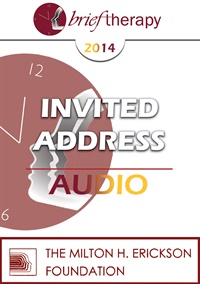
- Average Rating:
- Not yet rated
- Topic Areas:
- Post-Traumatic Stress Disorder (PTSD) | Meditation, Spirituality and Yoga | Invited Addresses | Trauma | Mind-Body
- Categories:
- Brief Therapy Conference | Brief Therapy Conference 2014
- Faculty:
- Bessel van der Kolk, MD
- Duration:
- 1:00:58
- Format:
- Audio Only
- Original Program Date:
- Dec 14, 2014
- Short Description:
- Chronic trauma interferes with self-perception and self-regulation. We will discuss effective approaches.
- Price:
- $15.00 - Base Price
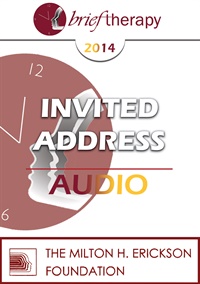
- Average Rating:
- Not yet rated
- Topic Areas:
- Consciousness | Invited Addresses | Neuroscience
- Categories:
- Brief Therapy Conference | Brief Therapy Conference 2014
- Faculty:
- Ernest Rossi, PhD
- Duration:
- 56:51
- Format:
- Audio Only
- Original Program Date:
- Dec 14, 2014
- Short Description:
- Current research in psychosocial genomics is reviewed to underpin a new evolutionary RNA/DNA epigenomic theory of the quantum transformations of consciousness and creative cognition. The alternating classical-to-quantum and quantum-to-classical transitions on all levels from mind to gene are explored for developing an understanding of how the 4-stage creative process operates in an evolving cosmos/consciousness field theory.
- Price:
- $15.00 - Base Price
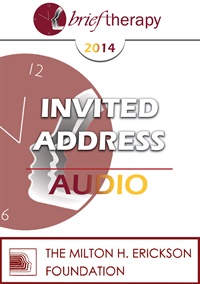
- Average Rating:
- Not yet rated
- Topic Areas:
- Happiness | Invited Addresses | Mindfulness | Brief Therapy | Buddhism
- Categories:
- Brief Therapy Conference | Brief Therapy Conference 2014
- Faculty:
- Ronald Siegel, PsyD
- Duration:
- 1:00:54
- Format:
- Audio Only
- Original Program Date:
- Dec 14, 2014
- Short Description:
- Everyone wants to be happy. While clinicians and researchers traditionally focused on helping troubled people feel less distressed—moving from -5 to 0 on the happiness scale—more recently they’ve branched out to investigate what actually leads to enhanced well-being. Some research findings point in surprising new directions, while others echo advice heard from wise elders and religious teachers across cultures and centuries.
- Price:
- $15.00 - Base Price
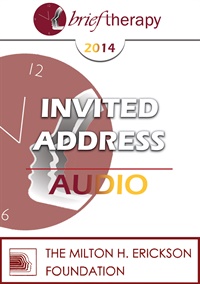
- Average Rating:
- Not yet rated
- Topic Areas:
- Invited Addresses | Brief Therapy | Future Oriented
- Categories:
- Brief Therapy Conference | Brief Therapy Conference 2014
- Faculty:
- Bill O'Hanlon, MS
- Duration:
- 1:04:06
- Format:
- Audio Only
- Original Program Date:
- Dec 14, 2014
- Short Description:
- Most therapy orients to the past. This session will offer an alternative, using "future pull," a method of engaging people in compelling preferred futures and working backwards to the near future to create change in brief therapy.
- Price:
- $15.00 - Base Price
Tags: Future Oriented Brief Therapy

- Average Rating:
- Not yet rated
- Topic Areas:
- Invited Addresses | Relationships | Brief Therapy | Couples Therapy
- Categories:
- Brief Therapy Conference | Brief Therapy Conference 2014
- Faculty:
- Pat Love, EdD
- Duration:
- 56:15
- Format:
- Audio Only
- Original Program Date:
- Dec 14, 2014
- Short Description:
- Relationships have changed since the dawn of the 21st century. Dating, mating, single life, sex-life, monogamy, matrimony, cohabitation, co-operation—all look different than a generation ago. As if it weren't challenging enough to keep up with pathological, technological, ethnic, educational, gender, geographic, socioeconomic, and sexual diversity, we now have the largest generational gap in modern history to contend with which means the relationship expectations and mores that made total sense to the Boomers now baffle many Millennials.
- Price:
- $15.00 - Base Price
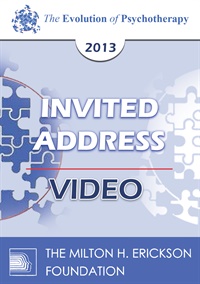
EP13 Invited Address 17 – Motivational Interviewing and The Language of Change – William Miller, PhD
- Average Rating:
- Not yet rated
- Topic Areas:
- Invited Addresses | Interviewing | Therapist Development | Motivation | Psychotherapy
- Categories:
- Evolution of Psychotherapy | Evolution of Psychotherapy 2013
- Faculty:
- William Miller, PhD
- Course Levels:
- Master Degree or Higher in Health-Related Field
- Duration:
- 53:56
- Format:
- Audio and Video
- Original Program Date:
- Dec 15, 2013
- Short Description:
- Motivational interviewing facilitates a natural process of “talking oneself into change.” Dr. Miller will provide an overview of the clinical method of motivational interviewing and its underlying psycholinguistic processes, based on recent research linking therapist and client in-session speech to behavioral outcomes. These dynamics appear to predict successful outcomes across a variety of psychotherapies.
- Price:
-
Sale is $29.00
price reduced from Base Price - $59.00
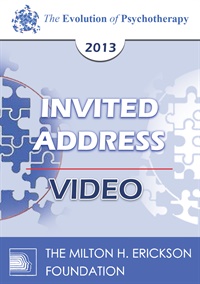
- Average Rating:
- Not yet rated
- Topic Areas:
- Couples Therapy | Invited Addresses | Communication | Conflict | Psychotherapy
- Categories:
- Evolution of Psychotherapy | Evolution of Psychotherapy 2013
- Faculty:
- Harville Hendrix, PhD
- Course Levels:
- Master Degree or Higher in Health-Related Field
- Duration:
- 58:14
- Format:
- Audio and Video
- Original Program Date:
- Dec 15, 2013
- Short Description:
- In the old way of thinking, stressed couples were depicted as a failed communication system of interacting pathologies that could be improved by therapists dispensing conflict resolution skills. In the new way of thinking, couples are the source of mutual healing and the fulcrum for social transformation. This lecture will discuss how that shift occurred and its implications, not only for the happiness of couples, but for the relational well-being of society.
- Price:
-
Sale is $29.00
price reduced from Base Price - $59.00
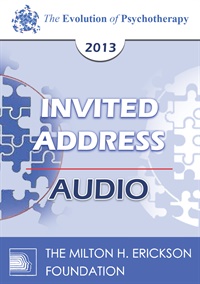
- Average Rating:
- Not yet rated
- Topic Areas:
- Psychotherapy | Invited Addresses
- Categories:
- Evolution of Psychotherapy | Evolution of Psychotherapy 2013
- Faculty:
- Steven Hayes, PhD
- Duration:
- 59:25
- Format:
- Audio Only
- Original Program Date:
- Dec 15, 2013
- Short Description:
- In this talk Dr. Hayes argues that human beings evolved for compassion and cooperation, based in part on the impact of eusociality on human language. This view has extraordinary implications for how we can achieve peace of mind, placing perspective taking and compassion at the center of psychotherapy itself. Such a view has the exciting possibility of bringing together different traditions in psychotherapy that often consider themselves rivals.
- Price:
- $15.00 - Base Price
Tags: Compassion Psychotherapy
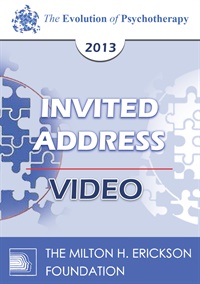
- Average Rating:
- Not yet rated
- Topic Areas:
- Invited Addresses | Children and Adolescent Therapy | Psychotherapy
- Categories:
- Evolution of Psychotherapy | Evolution of Psychotherapy 2013
- Faculty:
- Violet Oaklander, PhD
- Course Levels:
- Master Degree or Higher in Health-Related Field
- Duration:
- 56:22
- Format:
- Audio and Video
- Original Program Date:
- Dec 15, 2013
- Short Description:
- All children are born with the capacity to develop and use all of the aspects of the organism to live healthy, productive, joyful lives. We know that trauma interrupts the healthy development of the child. There also are some very basic developmental aspects that further thwart healthy development. An understanding of these hindrances is the first step toward helping children heal.
- Price:
-
Sale is $29.00
price reduced from Base Price - $59.00
Tags: Children Psychotherapy
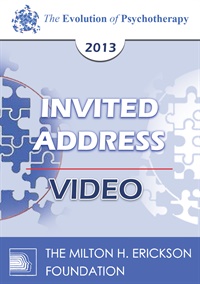
- Average Rating:
- Not yet rated
- Topic Areas:
- Psychotherapy | Invited Addresses | Personality Disorders | Psychopharmacology
- Categories:
- Evolution of Psychotherapy | Evolution of Psychotherapy 2013
- Faculty:
- Nicholas Cummings, PhD
- Course Levels:
- Master Degree or Higher in Health-Related Field
- Duration:
- 54:12
- Format:
- Audio and Video
- Original Program Date:
- Dec 15, 2013
- Short Description:
- In the age in which psychotropic medications have largely replaced psychotherapy, or medications are primary when psychotherapy is included, this presentation will demonstrate how psychotherapy alone can take precedence over medications, and achieve better outcomes than are currently being seen in our failing mental health system.
- Price:
-
Sale is $29.00
price reduced from Base Price - $59.00
Please wait ...

